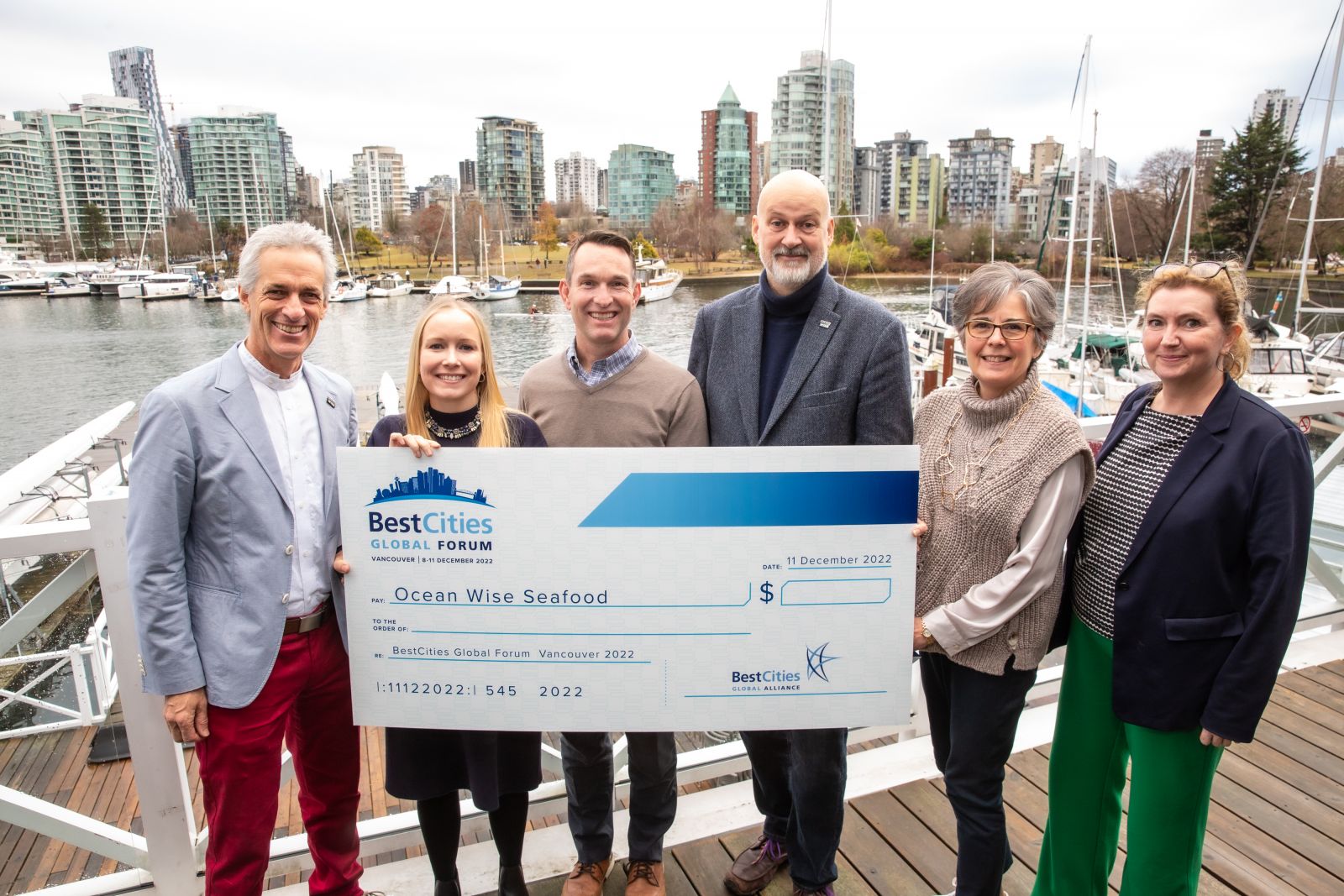“When it comes to reputation, there is a strong Vancouver connection to Nature”

 Destination Vancouver has signed the Glasgow Declaration on Climate Action in Tourism, and are committed to the Paris Agreement goals of reducing emissions by 2030 and achieving Net Zero by 2050. As a community, they are also stipulating city-wide targets similar to the above with very specific objectives around emissions from the built environment and energy transition, turning the page on pandemic with events that comply with these premises.
Destination Vancouver has signed the Glasgow Declaration on Climate Action in Tourism, and are committed to the Paris Agreement goals of reducing emissions by 2030 and achieving Net Zero by 2050. As a community, they are also stipulating city-wide targets similar to the above with very specific objectives around emissions from the built environment and energy transition, turning the page on pandemic with events that comply with these premises.
Gwendal Castellan (pictured right), the destination's sustainability manager, is one of the architects of this project and a guru on energy conservation for tourism businesses. After cycling across the Americas from Patagonia to the Northwest Territories, his passion for nature and geography led him to reorient his career as a certified energy consultant being hired by Tourism Vancouver to build a conservation programme for tourism businesses. “I think there is a great deal of collaboration with the municipal economic development office here!”
After the first contact in Vancouver a conversation was promised later, where the Canadian spoke about what remains to be developed in sustainable tourism, the movement that is driving the industry forward in a smart way, and the responsibilities DMOs face in this department.
1) Do you think COVID-19 acted as a driver for sustainable policies in Vancouver?
There have certainly been conversations in this regard. One of the examples during the COVID-19 period was that public transit use declined dramatically. We saw private car use going up something that from an environmental and city-building perspective required a natural response. With the restrictions now removed, we see that Vancouver is recovering much faster than other North American cities and part of that is due to the investment in maintaining the transport system at almost the same capacity as before. Right now, we are in the process of figuring out what the preferences and different behaviours are, testing future options in post-pandemic event planning. I think the events industry is still in a buffer zone that can serve as an evaluation period. We have to take into account the malleability of the new times, keeping what good has been done and being able to change at any moment without being so rigid.
2) How much is the recognition as one of the most liveable cities in the world due to the application of these changes and the general awareness of its population?
When it comes to reputation, there is a strong Vancouver connection to Nature. We have a long history of environmental activism, for example with Greenpeace − founded in Vancouver − or through the David Suzuki Foundation, a non-profit organisation aimed at protecting nature from an educational perspective. This is the awareness baseline for these causes proving that there is a community level of engagement. In terms of geography, the unique and cohesive urban form has also helped contain the proliferation of motorways and unbridled traffic. This has helped generate new environmentally friendly policies to continue building on this legacy. Many cities are dealing with issues such as affordability and housing costs, trying to understand what is driving that. Since we are squeezed between mountains, ocean, and farmland, we try to find a balanced economy of space. For example, Vancouver has a downtown core with a housing density of almost 20000 people per km2 living in flats, way ahead of other North American cities.
"If we replace an inefficient building with an efficient one, we will be closer to Net Zero at that location."
3) With the advances and progress that Vancouver has undergone in these years, how do you plan to redesign business events around the circular economy?
Much of this has to do with lifting the foundations of the destination across the board. As our community and City Council are looking for change, all the companies and suppliers that serve corporate events are actually keeping up with these transformations. When you make the decision to hold an event in Vancouver, it can be the last big decision when it comes to sustainability as we strive to have everything covered on our side. After that, every choice is aligned in that circularity making events automatically more sustainable. It’s not about navigating our environment to find the most responsible supplier because both choices will fit the sustainability measures − thus leaving room for other factors. That will be the ultimate goal. Implementing the right regulations in order to lift the baseline practices for all suppliers.

4) Are your green policies and sustainable standards also influencing the events you bring to Vancouver? With all this certification going on, how would you react if you had to bid on a major oil or natural gas conference?
That’s a pretty interesting one. [laughs] These are industries that exist and we’re not going to make them disappear through our work. One argument would be that these kinds of conferences are not scheduled for the city and so we shouldn’t try to bid for them. Another argument is that by taking advantage of this opportunity, we could market Vancouver as a hotbed for discussions on sustainability even if this industry is not. So, by hosting an oil conference, one could prompt a transformative change in its event programme and lessen its negative impact. You also need to explain the context of the event within the public strategy, because if the community doesn’t understand it can end up being a PR nightmare. By instance, if congressmen are not at all interested in having that conversation, they will come here just to get numbers. However, I believe that many of these industries bring in great researchers, experts and academics and that can be quite interesting for the local scientific communities. If you communicate that conference in a constructive way according to our green positioning, why not have it here! You can find out during the bidding cycle what they really want so that the right decisions can be made.
"When you make the decision to hold an event in Vancouver, it can be the last big decision when it comes to sustainability, as we strive to have everything covered on our side."
5) Is there any joint work between hotels and small venues to draw up a sustainable accommodation roadmap for business visitors?
In Vancouver, we have three watersheds that are fed by snowmelt and supply the entire city − the dams allow us to know exactly how much water we have during the year and to measure our supply. As we see water patterns change, water consumption and budgets will also follow suit with corresponding restrictions. With the various investments in infrastructure and technology, hotels will have to be really careful with their water consumption over time reopening the discussion about low-flow showers. Certain properties are conducting blind tests, installing an entire floor of low-flow showers to try to understand what the customer response is. I am convinced that more and more congresses will take responsibility for carbon emissions per room night in the contract. This will become a normal and obvious practice. We will soon have also mandatory building energy and carbon emissions reporting which means that if hotel A emits half the carbon of hotel B, this may offer a competitive edge in the choice of accommodation. Over the course of normal redevelopment cycles with the city implementing planned policies to limit embodied carbon and mandatory net-zero performance requirements in new construction, we will see a shift to Net Zero buildings in Vancouver. We also have policies and targets around the reduction of embodied emissions by adopting mass timber construction to replace concrete, and will require mandatory disclosure of energy and carbon emissions for buildings in the future.

Ocean Wise Seafood - an organisation whose mission is to protect and restore the world's oceans - is awarded a grant by BestCities Global Forum
6) We also saw that many event destinations are reconverting their destination marketing to include more action areas like sustainability. What are Vancouver’s benchmarks when bidding for events?
When we look at the bidding as a whole, we pay attention to what are the core industries in Vancouver in terms of attracting investment. How does that align with the industries that we have here and other industries that are starting to grow? We were talking earlier about the green building sector: one of your strategies is to help develop local skills in the sector and the technologies that go with it, like heat pumps or structural mass timber. If there are events and conferences that tie into that sector in some way, then there is room for collaboration. This shows that events are catalysts and can also be linked to local economies in order to establish regional and national offices or even an association headquarters. That has to do with the economic sphere but it also speaks to the much less siloed realm of a professional conference which is usually impervious to civil society. What's really exciting is that people want to have this fluid exchange where what happens in a conference centre has some kind of return in their lives. It could be for a university or students, for the purpose of mentoring or scientific engagement, or as we speak for an industry or development trade show. So that the sum of the knowledge discussed at these conferences leaves the convention centre and reaches the core of the community.
Other Articles
About Us
Supported by the Union of International Associations (UIA), the International Association of Professional Congress Organisers (IAPCO) and the Interel Group, the global public affairs and association management consultancy, Headquarters Magazines serve the needs of international associations organising worldwide congresses.














